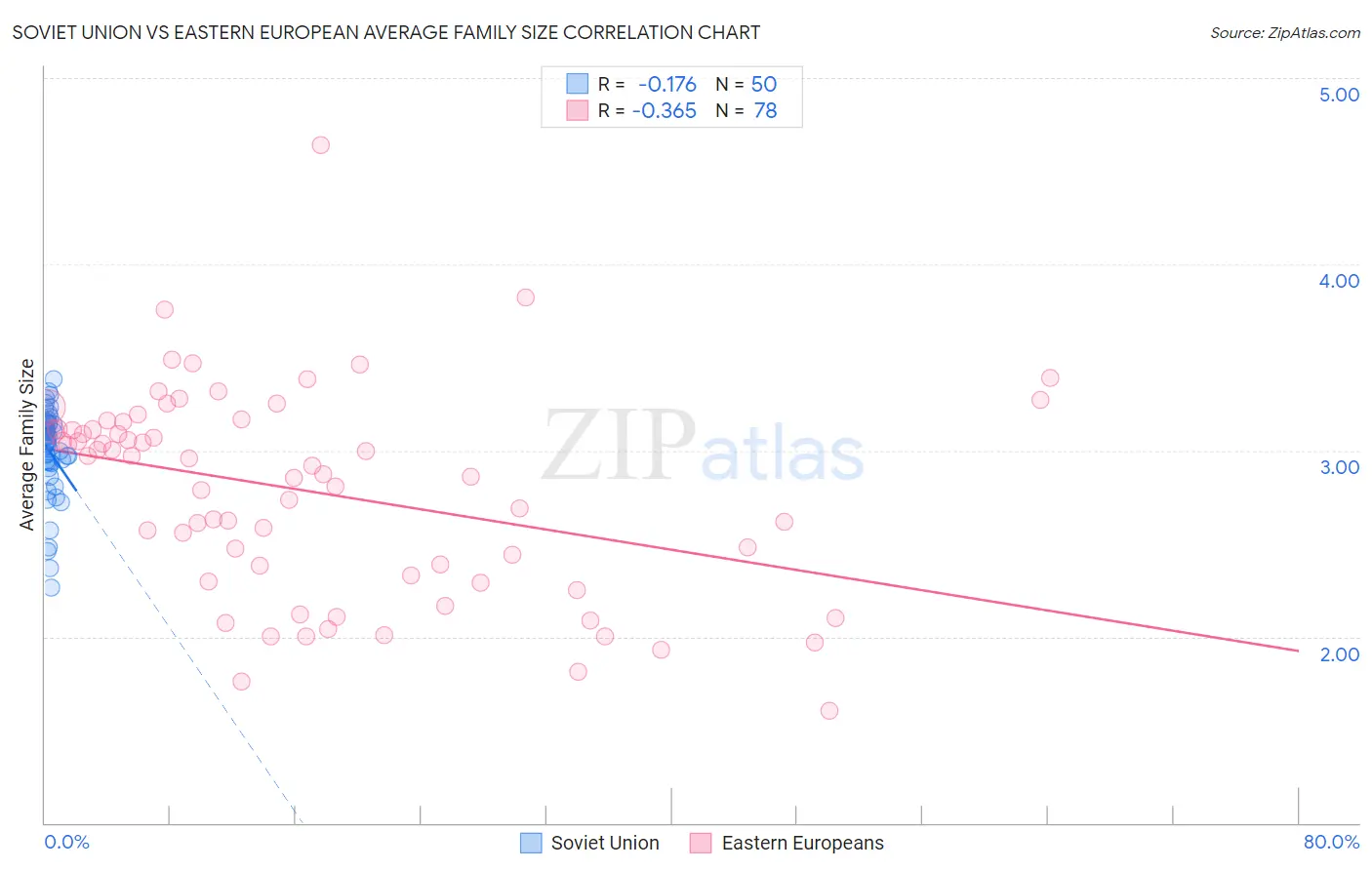Soviet Union vs Eastern European Average Family Size
COMPARE
Soviet Union
Eastern European
Average Family Size
Average Family Size Comparison
Soviet Union
Eastern Europeans
3.11
AVERAGE FAMILY SIZE
0.0/ 100
METRIC RATING
323rd/ 347
METRIC RANK
3.12
AVERAGE FAMILY SIZE
0.1/ 100
METRIC RATING
318th/ 347
METRIC RANK
Soviet Union vs Eastern European Average Family Size Correlation Chart
The statistical analysis conducted on geographies consisting of 43,509,630 people shows a poor negative correlation between the proportion of Soviet Union and average family size in the United States with a correlation coefficient (R) of -0.176 and weighted average of 3.11. Similarly, the statistical analysis conducted on geographies consisting of 460,961,118 people shows a mild negative correlation between the proportion of Eastern Europeans and average family size in the United States with a correlation coefficient (R) of -0.365 and weighted average of 3.12, a difference of 0.14%.

Average Family Size Correlation Summary
| Measurement | Soviet Union | Eastern European |
| Minimum | 2.27 | 1.60 |
| Maximum | 3.38 | 4.64 |
| Range | 1.11 | 3.04 |
| Mean | 2.99 | 2.78 |
| Median | 3.05 | 2.90 |
| Interquartile 25% (IQ1) | 2.93 | 2.33 |
| Interquartile 75% (IQ3) | 3.15 | 3.12 |
| Interquartile Range (IQR) | 0.22 | 0.79 |
| Standard Deviation (Sample) | 0.24 | 0.55 |
| Standard Deviation (Population) | 0.24 | 0.55 |
Demographics Similar to Soviet Union and Eastern Europeans by Average Family Size
In terms of average family size, the demographic groups most similar to Soviet Union are Immigrants from Austria (3.12, a difference of 0.030%), Immigrants from Canada (3.12, a difference of 0.030%), Immigrants from North America (3.12, a difference of 0.060%), Celtic (3.11, a difference of 0.080%), and English (3.11, a difference of 0.12%). Similarly, the demographic groups most similar to Eastern Europeans are Welsh (3.12, a difference of 0.0%), Italian (3.12, a difference of 0.010%), Serbian (3.12, a difference of 0.070%), Immigrants from North America (3.12, a difference of 0.070%), and Immigrants from Austria (3.12, a difference of 0.10%).
| Demographics | Rating | Rank | Average Family Size |
| Czechoslovakians | 0.1 /100 | #310 | Tragic 3.13 |
| Immigrants | Northern Europe | 0.1 /100 | #311 | Tragic 3.13 |
| Immigrants | Australia | 0.1 /100 | #312 | Tragic 3.13 |
| Bulgarians | 0.1 /100 | #313 | Tragic 3.13 |
| Russians | 0.1 /100 | #314 | Tragic 3.12 |
| Immigrants | Scotland | 0.1 /100 | #315 | Tragic 3.12 |
| Serbians | 0.1 /100 | #316 | Tragic 3.12 |
| Italians | 0.1 /100 | #317 | Tragic 3.12 |
| Eastern Europeans | 0.1 /100 | #318 | Tragic 3.12 |
| Welsh | 0.1 /100 | #319 | Tragic 3.12 |
| Immigrants | North America | 0.0 /100 | #320 | Tragic 3.12 |
| Immigrants | Austria | 0.0 /100 | #321 | Tragic 3.12 |
| Immigrants | Canada | 0.0 /100 | #322 | Tragic 3.12 |
| Soviet Union | 0.0 /100 | #323 | Tragic 3.11 |
| Celtics | 0.0 /100 | #324 | Tragic 3.11 |
| English | 0.0 /100 | #325 | Tragic 3.11 |
| Ottawa | 0.0 /100 | #326 | Tragic 3.11 |
| Dutch | 0.0 /100 | #327 | Tragic 3.11 |
| Czechs | 0.0 /100 | #328 | Tragic 3.11 |
| Belgians | 0.0 /100 | #329 | Tragic 3.11 |
| Latvians | 0.0 /100 | #330 | Tragic 3.11 |